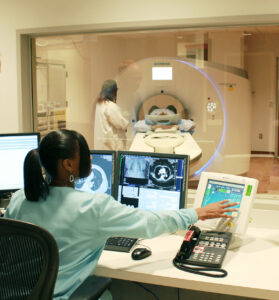Editor’s note: The American College of Radiology invites all stakeholders, including patients, to respond to a survey about the process of recommending follow-up care for incidental findings on imaging exams. The survey, which is available in two versions – one for patients and one for physicians, clincial staff and administrators – will inform two ACR projects, both designed to improve follow-up for abnormal findings unrelated to the patient’s original evaluation. The following ACR news release contains more information and links to the surveys.
Radiologists, referring clinicians, associated staff and patients are encouraged to participate in the “Closing the Results Follow-Up Loop Stakeholder Survey” benefitting two American College of Radiology (ACR) initiatives that are seeking recommendations to improve the follow-up of incidental findings on imaging exams.
Input to the brief stakeholder surveys will guide the work of the ACR technical expert panel (TEP) supported by The Gordon and Betty Moore Foundation Diagnostic Excellence Initiative. The panel will develop quality measures to improve adherence to evidence-based, follow-up recommendations for incidentally detected abnormal imaging findings. Survey results will also contribute to the development of a care coordination white paper — a collaboration between the ACR and the American College of Emergency Physicians (ACEP) — on the follow-up of incidental imaging findings in the emergency department setting.
Greg Nicola, MD, FACR, the new chair of the ACR Commission on Economics, serves as the ACR chair of the “Improving the Follow-Up of Recommended Imaging for Incidental Findings” white paper with ACEP. He notes that no universal protocol currently exists for the follow-up of incidental radiographic findings and communications about additional imaging not relevant to the patient’s primary evaluation.
“This current gap in care coordination will continue to result in greater patient morbidity or mortality, increased care costs and exposure of referring physicians and radiologists to medical and legal risks, until coordinated processes are in place to close the results follow-up loop,” he warned.
Nadja Kadom, MD, director of pediatric neuroradiology and director of quality in the radiology department at Children’s Healthcare of Atlanta, and co-chair of the Closing the Results Follow-Up Loop measure development TEP, emphasized that these projects present tremendous opportunities to improve the delivery of evidence-based radiologist-recommended follow-up care.
“As a result, we expect to see a greater volume of patients benefiting from the early detection of cancer or other treatable conditions and significantly better outcomes,” Dr. Kadom said.
Please support these initiatives by completing the survey and encouraging other radiologists, referring clinicians, facility administrators and patients to also share their experiences and preferences.
Complete the survey for physicians, clinical and administrative staff .





